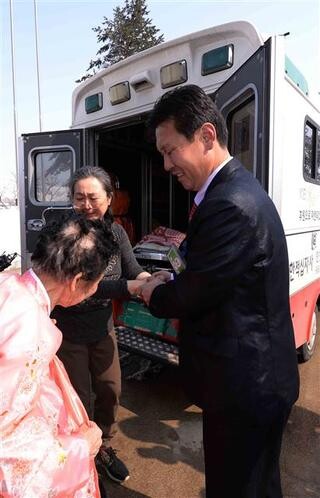hankyoreh
Links to other country sites 다른 나라 사이트 링크
Abductees to N. Korea participating in divided family reunions

By Ha Eo-young, staff reporter
One noteworthy aspect of the current reunions for families divided by the Korean War is the participation of five people abducted by North Korea, including Park Yang-soo, who was on the Odaeyang, a ship that was captured by North Korea in 1972. South and North have vastly different positions on the issue of abductees and prisoners of war (POWs), making it a matter of considerable delicacy. South Korea claims that these people were kidnapped, while North Korea insists that they came to the North of their own accord.
The abductees are divided into two categories: wartime abductees, who were taken to the North during the Korean War, and postwar abductees, who were brought to the North after the armistice agreement was signed in 1953. While the South Korean government’s current official tally of wartime abductees is 2,825, the number is unofficially estimated to reach the tens of thousands.
From the hijacking of the Daesong fishing boat in 1955 until the present, there have been 3,835 postwar abductees. Of these, 3,310 were returned to South Korea within a year, but 516 were never repatriated.
Classified as “special divided families” along with POWs, a few abductees have been participating in the divided family reunions since the second round in Nov. 2000. Including the current reunions, 18 abductees have met their relatives in South Korea. Six of them were crewmembers on the Dongjin #27, which was kidnapped near Baengnyeong Island in the West (Yellow) Sea in 1987.
It is also estimated that around 500 South Korean POWs are still alive in North Korea. So far, approximately 80 of these POWs have come back to the South, beginning with First Lieutenant Cho Chang-ho in 1994. North Korea claims that the South Korean POWs are refugees who choose to remain behind.
After the inter-Korean summit in 2000, the South Korean military added the POWs issue to the agenda for the meeting between the two Defense Ministers, but the North has refused to even discuss the issue.
The North has allowed 12 of these POWs to join the divided family reunions, including four during the 2010 reunions. However, no POWs are taking part in the current reunion.
In consideration of the sensitivity of the abductee and POW question, the Kim Dae-jung and Roh Moo-hyun administrations tried to approach these as quietly as possible. But since the administration of Lee Myung-bak, the South Korean government has been broaching these issues openly along with the other divided family issues. The Unification Ministry has also made the issue public by including it in the key objectives when reporting to recent presidents Lee and Park.
Please direct questions or comments to [english@hani.co.kr]

Editorial・opinion
![[Column] Season 2 of special prosecutor probe may be coming to Korea soon [Column] Season 2 of special prosecutor probe may be coming to Korea soon](https://flexible.img.hani.co.kr/flexible/normal/500/300/imgdb/original/2024/0426/3317141030699447.jpg) [Column] Season 2 of special prosecutor probe may be coming to Korea soon
[Column] Season 2 of special prosecutor probe may be coming to Korea soon![[Column] Park Geun-hye déjà vu in Yoon Suk-yeol [Column] Park Geun-hye déjà vu in Yoon Suk-yeol](https://flexible.img.hani.co.kr/flexible/normal/500/300/imgdb/original/2024/0424/651713945113788.jpg) [Column] Park Geun-hye déjà vu in Yoon Suk-yeol
[Column] Park Geun-hye déjà vu in Yoon Suk-yeol- [Editorial] New weight of N. Korea’s nuclear threats makes dialogue all the more urgent
- [Guest essay] The real reason Korea’s new right wants to dub Rhee a founding father
- [Column] ‘Choson’: Is it time we start referring to N. Korea in its own terms?
- [Editorial] Japan’s rewriting of history with Korea has gone too far
- [Column] The president’s questionable capacity for dialogue
- [Column] Are chaebol firms just pizza pies for families to divvy up as they please?
- [Column] Has Korea, too, crossed the Rubicon on China?
- [Correspondent’s column] In Japan’s alliance with US, echoes of its past alliances with UK
Most viewed articles
- 1[Column] Season 2 of special prosecutor probe may be coming to Korea soon
- 2No good, very bad game for Korea puts it out of Olympics for first time since 1988
- 3‘We must say no’: Seoul defense chief on Korean, USFK involvement in hypothetical Taiwan crisis
- 4Division commander ordered troops to enter raging flood waters before Marine died, survivor says
- 5Is Japan about to snatch control of Line messenger from Korea’s Naver?
- 6Korea’s 1.3% growth in Q1 signals ‘textbook’ return to growth, says government
- 7Is N. Korea threatening to test nukes in response to possible new US-led sanctions body?
- 8[Editorial] Korea’s surprise Q1 growth requires objective assessment, not blind fanfare
- 9[Editorial] New weight of N. Korea’s nuclear threats makes dialogue all the more urgent
- 10[Editorial] In the year since the Sewol, our national community has drowned